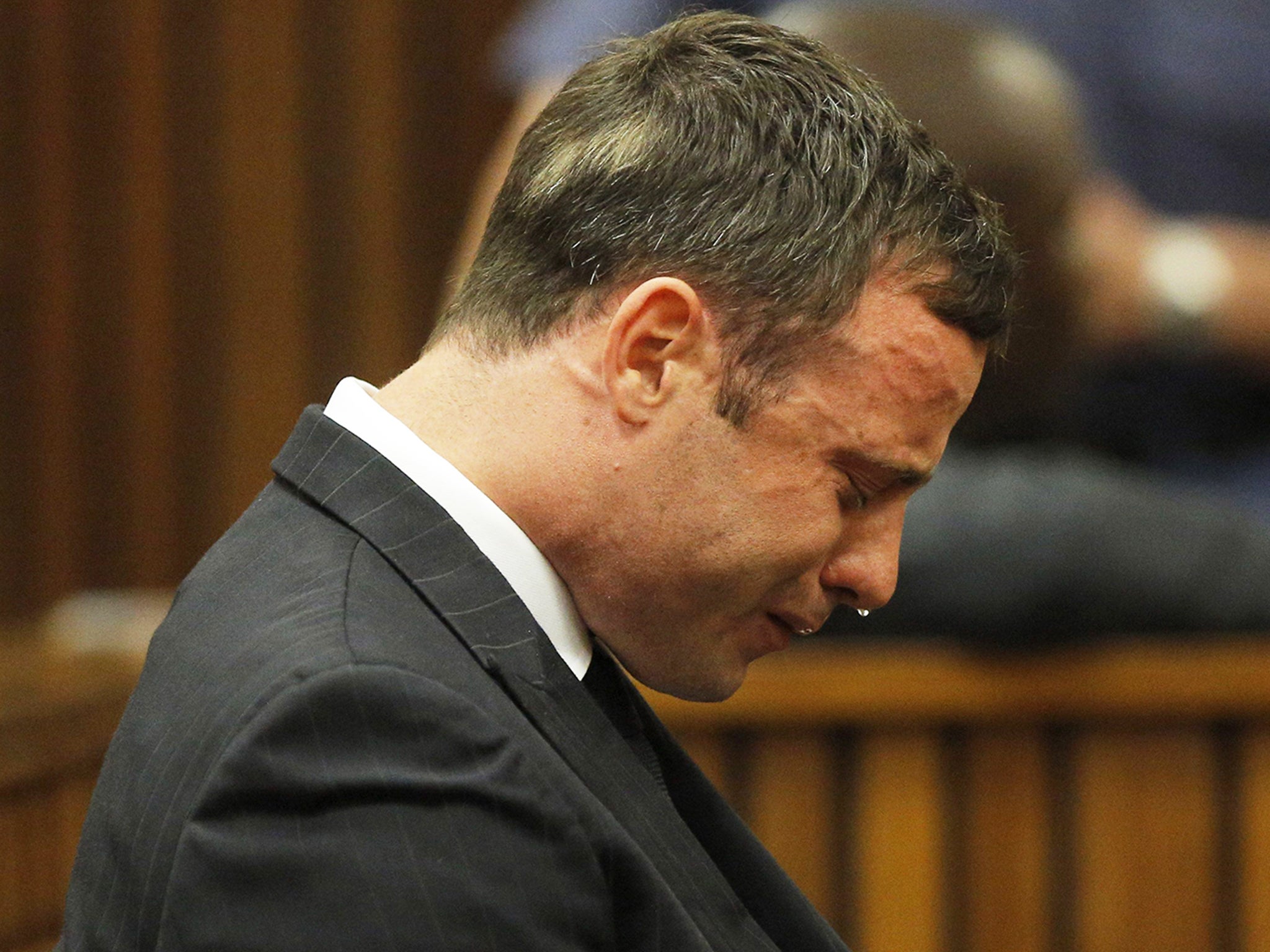Oscar Pistorius: A lesson in how fame can have disastrous consequences
The people of South Africa have lost a national hero, and world sport has lost an inspiration

Oscar Pistorius was not the first in his family to sleep with a gun close to hand. His parents divorced when he was six, and his mother Sheila – a paranoid alcoholic according to Dr Merryll Vorster, a psychiatrist called as an expert witness at his trial – kept hers under her pillow.
She was, the athlete has said many times, his principal inspiration and the driving force behind his success. She died suddenly when he was 15, and he has her date of death tattooed on his forearm.
Those who know him have spoken of a frenzied desire to prove himself, a trait clearly inculcated in him by Sheila. He recalled how he and his older brother Carl would go out to play. “You, put your shoes on,” she would tell Carl. “And you, put your legs on,” she would say to Oscar.
If he was out to prove himself that fateful Valentine’s Day night in 2013 when he shot and killed his girlfriend Reeva Steenkamp, he is paying a heavy price for it today – found guilty of culpable homicide having been cleared of premeditated murder.
During the trial there was plenty of evidence that, quite apart from his physical disabilities, Pistorius was damaged even in childhood. His father Henke, according to Dr Vorster – a defence witness, it should be remembered – was viewed by his son as “an irresponsible and mostly absent parent”, and in his autobiography Pistorius described himself and his brother, growing up without their father, as “rudderless boats”. His mother’s determination that he should appear as “normal” as possible, despite the double below-the-knee amputation he underwent at 11 months, was seen as piling more stress on the young boy.
“The children were not soothed by their mother,” Dr Vorster told the court. “The children were reared to see their external environment as threatening.” Pistorius’s teens were unsettled: the family moved from place to place, and Pistorius, she said, was passed around between parents and relatives. His mother’s death left him with “no adult primary attachment figure,” leading to a generalised anxiety disorder.
She outlined his insecurity, his discomfort with interviews, his fear of public embarrassment, a “gradually developed poor self-image and feelings of inadequacy about his amputations.” It’s entirely rational to be fearful in one’s own home in South Africa, with its high levels of violent crime – but Pistorius’s fame, he felt, singled him out as a particular target, a fear exacerbated by his disability. “Mr Pistorius is more likely to respond with a fight response rather than a flight response as his physical capacity for flight is limited,” said Dr Vorster.
Even while he was South Africa’s golden boy, with his cabinet full of medals and his creditable attempts to compete against the able-bodied elite, tales abounded of his craziness, his insane risk-taking, his propensity for violent outbursts and his obsession with firearms. He once told the story of running over a dog in his car. He got out to see the animal with a clearly broken back. The owner was advancing angrily. Pistorius didn’t think twice: he got out his gun and shot the dog dead.
When Pistorius went on trial countless stories came out, few of which reflected well on a man some think had let success go to his head (at one point he owned two white tigers, to go with his pit bull and bull terrier). His room-mate at the 2012 Olympics decided was forced to move out: “Oscar is always shouting at people on the phone,” he said. During the Games, one reporter, observing him in the gym, couldn’t believe his behaviour: “his swearing would astonish the mothers and children also using the gym. He would storm out midway through a work-out.”
Fame clearly wrought disastrous changes on Oscar Pistorius. The humble, respectful boy, full of determination and guts, turned into a brash and arrogant man, full of anger and frustration. While he may not be guilty of premeditated murder, the life he knew before the death of Reeva Stenkamp is effectively over.
He was hailed as a world-beating figurehead for the new South Africa, newly emerged from the darkness of apartheid into a bright dawn in which the country could hold its head high and take its place among the nations of the world. Instead he became a symbol of a country still a long way from being at peace with itself, a gun-crazy frontier state beset by sickening violence.
The people of South Africa have lost a national hero and the world of sport has one fewer figure of inspiration. He may return to top-level athletics eventually, but he will not remembered for his medals, his overwhelming desire to succeed, his stunning success on the track. He will be remembered for shooting his girlfriend dead: a huge, shadow will hang over him, his family and the Steenkamps, as long as they all live.
Join our commenting forum
Join thought-provoking conversations, follow other Independent readers and see their replies
Comments
Bookmark popover
Removed from bookmarks